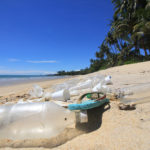Threats to ocean health have taken center stage in the news in the last few years, and with good reason. At least two gigantic plastic garbage patches swirl in the world's seas, encompassing hundreds of thousands of square miles. An oft-cited study warns that if we don't stop emptying the seas at a reckless speed, the ocean's will be empty of fish by 2048. Coral reefs face threats of their own, from acidification to bleaching to even more overfishing. Without both governmental and direct action, the future of our oceans is bleak. Here are our picks for seven small steps you can take to help save the ocean each day and when you go on vacation.
Make your voice heard
Let your political representatives know that the ocean and its inhabitants matter to you. Although we can all do our part individually, ultimately the fate of the world's oceans lies in the realm of policy change. Become involved in conservation organizations like Oceana and Sea Shepherd, and call your representatives when ocean-related issues come up for votes.
Along with this goes educating your non-diving friends. When they ask about your experiences, share the beauty of the underwater world with them, emphasizing its importance when it comes to conservation. Tell them about the plastic bags you see on dive sites as well, however, and about how much trash you pick up on a dive. If you see coral bleaching, tell them about it and what they can do to help alleviate it, even if they don't feel personally affected. You're likely the ocean's ambassador for most of the people you know. Use the platform.

Shrink your carbon footprint
If you live in a city, shrink your carbon footprint by driving less and taking public transportation. Bike and walk more if possible. If you've got a long commute, try to set up carpools with neighbors and friends who might be going the same way. Make sure your home is as energy efficient as possible by switching to LED or fluorescent bulbs. Use a fan instead of blasting the AC and put on a sweater instead of turning up the heat. Being mindful of your carbon footprint and reducing energy consumption on a personal level can help lead to a greener world overall.
Eat less fish (or cut it out entirely)
Far more important than even your energy habits at home is what's on your plate. Illegal fishing is rampant across the globe, and the supply chain is very hard to trace. Quite often the species being sold to you isn't what it's advertised to be at all. Even if you think you're eating a sustainably caught fish dinner, there's no guarantee. Shrimp trawling, in particular, is damaging not only to the animals themselves, but also wildly so to the environment. If you must eat fish, be sure you know where it comes from, and only eat species that are so far deemed "sustainable." The best thing you can do for the ocean, however, is cut seafood out of your diet entirely.

Clean up whenever (and wherever) you can
Plastic has become the biggest pollution issue in the marine environment, affecting everything from the very top to the bottom of the food chain. Submersibles have even found plastic in the ocean's deepest reaches. Sea creatures eat these plastic items, from microplastic to plastic bags. Not only do these items negatively affect the animals themselves, but also those animals that prey on them. Participate in local beach or lake cleanups whenever possible and pick up any trash you see underwater on a dive.
Donate to the right cause
Many smaller marine charities are emerging as of late, dedicated to niche causes, such as smaller marine sanctuaries. Find the niche you are interested in, whether it's sharks or nudibranchs, kelp forests or archaeology and donate or volunteer to that cause. Don't be shy to raise awareness yourself. Assemble a group of friends and family and influence change in your community by educating your peers about ocean health.

Cut out single-use plastic
As mentioned above, plastic is the scourge of the ocean. Aside from recycling whenever possible and picking it up on dives and beach cleanups, the best thing you can do is avoid it altogether as much as possible. Tell your server you don't need a straw the next time you eat out and replace plastic items in your life easily and affordably. Buy reusable tote bags for shopping and reusable produce bags. Cut out the plastic razors and toothbrushes — you'll find changes are easy and affordable for almost every facet of your daily life.

Be an eco-tourist
When you go on dive vacation, do your research about not only the destination but the dive shop. Choose operators that follow eco-friendly practices and care for the environment they rely upon. Once you arrive, treat your destination just as you would your home. Don't carelessly dispose of plastic or trash; use your towels more than once; and turn off your lights when you leave your hotel room. If you're bringing plastic bottles containing toiletries with you, take them home to recycle if they're empty rather than leaving them behind. Many developing nations lack recycling facilities for your trash, and leaving it there means burdening a system that is likely already stretched to the limit.
The post Seven Steps You Can Take to Help Save the Ocean appeared first on Scuba Diver Life.
from Scuba Diver Life https://ift.tt/2JSao8Q
No comments:
Post a Comment